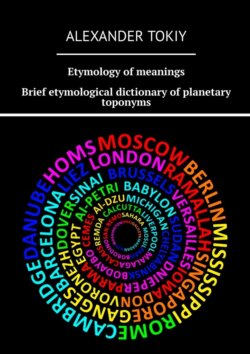Читать книгу Etymology of meanings. Brief etymological dictionary of planetary toponyms. At the origins of civilization - Alexander Tokiy - Страница 11
Between two rivers
ОглавлениеAnother word that deserves close attention is Mesopotamia. This toponym\place names well shows how complex words appeared from simple roots. Mesopotamia (Μεσοποταμία) is a Greek word, and it is interesting because it has two protoroots “ms” at once.
The first—“meso” (μέσος)—has the meaning “average”, “middle”. The origin of the meaning is understandable: any body of water, and especially a river, always divides something: the left Bank, the right Bank… The river seems to be “mezhdu” (between). From this understanding came the meaning of the word “mezha” (boundary-line). And the chain of related values can be extended to the present: “mezha”, “meso” (meso, mezzo), the case form “midas” (median, medium and others).
But the second part of the word—“potamos” (ποταμός)—is translated both as “place” and as “river”. In addition protoroot “ms” in the word there are also two ancient protoroots (prepositions): “po"and” ta” are sounds of “puffing” and “poking”. These sounds (prepositions) speak about the place, about the location. Mesopotamia is a place between rivers. These prepositions with different vowels you will find in the names of a huge number of toponyms\place names: the Te-mza River (the Thames), the Te-rek River, the Ti-br River, the Ti-gr River, the city of To-t`ma, the To-bol River, the Po River, the Pola River, the Po-lonka River, the city of Po-ltava, the city of Po-lessk, the city of Po-lotsk, the Po-gara River, the city of Po-dolsk, the city of Bo-lonya, the city of Ba-at, the city of Pa-rizh (Paris), the city of Pa-rma, Lake Ba-aikal, the city of Bo-lkhov, the city of Bu-gulma, the city of Bo-dai-bo, and thousands of others. The same sounds form the Greek word “toponym” (τοπωνύμιο), where “topos”(τόπος) is “place”, and “onoma” (ὄνομα) is “name”. The name of the place! And Russian word “place”– “ms-to”—should be read as a place near water (spring, stream, river, lake). If we add the ancient preposition “po”—“around, along”, we get the word “pomest`e” (estate, possession).
We are dealing with very ancient sounds. Near the city of Washington, for example, the Potomac River flows, whose name is made up of the same ancient prepositions “po” and “to”. Translated from the Algic languages Potomac is a “place”, later: a trading place. People often enough met and traded by the water. I might add that the city of Washington is also located between the Potomac and Anacostia rivers. It is American Mesopotamia or Entre Rios!
I don’t know what impression the native American name Potomac made on the first Spaniards, but I think Columbus’s contemporaries heard quite familiar sounds. In the English version, the sound of the ending “k” is spelled with the Latin letter “c”. Who first recorded it in this version is a mystery. But if you read the letters, that the Potomac should sound “the Potomas”. I’m sure that’s the name of this river should sound like it! The root basis in toponyms\place names is very stable, so no matter how the vowels change, the consonants carry the main meaning. However, as soon as the root becomes auxiliary, service, becomes an affixed morpheme, it loses this stability. Thus, in the word “potamos” (ποταμός) the root “ms” is preserved, and in the toponym/place name “Mesopotamia” the sound “s” at the end of the word is lost. The same distortions have occurred for thousands of years with the names of the rivers Tom’ and Om’.
Many toponyms\place names of my beloved Crimea have also preserved their ancient roots. For example, in the Crimea there is a river called Putamish—“po-ta-ms”. It originates in the Babugan-yayly mountains, and therefore refers to the movement “on the road down from the mountain”. Into this river flows a smaller river called the Western Putamis, which also retains in its name the ancient sound of drinking. And some rivers got new names. Other peoples who spoke other languages and dialects came and invented or brought with them names that they could understand better. For example, the Ulu-Uzen’ River, flowing near the city of Alushta, was formerly called Megapotamo. Thus, in different parts of the world you can find place names with the same roots: the Potamo, the Megapotamo, the Potomac, the Putamish and the Mesopotamia. In the latter, two “ms” are hidden at once, dating back to the oldest civilizations in the interfluve of the Tigris and the Euphrates.
